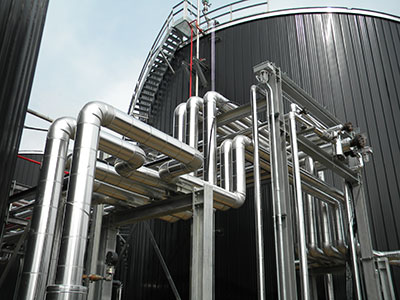When I choose tank insulation, the biggest question is whether it can provide enough support and protection for my facility.
Cellular glass insulation is a firm and solid material. It combines glass and carbon to create a closed cell structure, giving it excellent rigidity and stopping moisture from getting inside.

Rigidity matters a lot in industrial settings. If insulation bends or crushes under weight, it cannot protect tanks or keep temperatures steady. In my experience, cellular glass is unique because it stays in one piece even under heavy pressure. I see chief engineers like Hans Müller pick it for big chemical plants since they want something that will last and require as little attention as possible. With cellular glass, the tanks stay safe and efficient for many years without needing costly repairs.
What is cellular insulation?
People ask me what cellular insulation actually means. The answer is simple — it’s insulation made with many tiny closed cells that hold air and keep water out.
Cellular insulation such as cellular glass uses a tight bubble-like construction. This stops moisture and holds heat, helping tanks and pipes work better.

Glass foam insulation is the most common type of cellular insulation. The way it’s made is special. Manufacturers melt glass with carbon at high temperatures, causing it to foam and form solid, air-filled blocks. These air bubbles inside each block keep water out and help make the insulation tough and reliable. This structure means cellular insulation works well for industrial use. When chief engineers like Hans think about what to use, they look for materials that stay strong, stop moisture, and don’t break down. Other types, like polyurethane foam and extruded polystyrene, have similar ideas but often aren’t as strong or water-resistant as cellular glass.
What is considered rigid insulation?
Rigid insulation means it doesn’t change shape or flatten over time when under pressure. For tanks and pipes, this is a must.
Some insulation types, such as cellular glass, extruded polystyrene, and polyurethane foam, offer needed firmness and stop problems like sagging or water leaks.

When I choose insulation, rigidity ranks at the top. I need something that doesn’t bend, collapse, or lose its ability to insulate, especially after years of use. Cellular glass is reliable because it keeps its shape, handles heavy loads, and doesn’t let water in. Other common rigid insulations, including polystyrene and polyurethane foam, are also strong but may not be as fire-resistant or reliable against moisture damage. For engineers like Hans, using rigid insulation helps keep the entire tank system safer for longer, cutting down on repairs and keeping costs in check.
What is the temperature range for cellular glass insulation?
Cellular glass insulation can work between extreme temperatures, from as cold as -268°C to as hot as 430°C.
Cellular glass handles temperature swings without losing strength or insulation, making it a top pick for chemical plants and cold storage.
I remember dealing with insulation that cracked when it got too cold, causing big problems. Cellular glass stands out because it doesn’t shrink, melt, or fall apart, even in freezing or very warm conditions. Its closed cell structure prevents water from getting inside, while its fire safety gives extra protection. This ability to work across wide temperature differences means that engineers can use cellular glass for everything from liquid gas tanks to chemical processing. It’s reliable no matter what the conditions are.
What is cellular glass insulation used for?
Cellular glass insulation is mostly put to work protecting tanks, pipes, and other equipment from losing heat or taking in moisture and resisting fire.
Its solid strength and water resistance make it popular for chemical tanks, cryogenic storage, and many HVAC systems.

In the industrial projects I’m involved in, cellular glass insulation shows up everywhere. Hans Müller and his team use it mainly in cryogenic tanks, where any little bit of moisture could freeze and cause damage. It also helps prevent fires and stops temperature changes from causing problems. Cellular glass stands up to pressure and lasts a very long time without much attention. Because of these properties, engineers trust it for things like protecting pipes, tanks, roofs, and even substations. For them, cellular glass means lower maintenance costs and better safety for years.
Conclusion
Cellular glass insulation has top-level rigidity, works with extreme temperature ranges, and stands up to tough industrial jobs for long-lasting performance.

